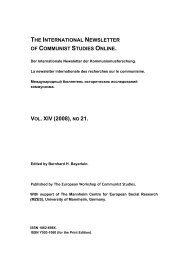11RXNdQ
11RXNdQ
11RXNdQ
Create successful ePaper yourself
Turn your PDF publications into a flip-book with our unique Google optimized e-Paper software.
martyr’ (this volume, p. 200). Sartre presents the Congo as a symbol hypostatizing the<br />
destiny of Africa: ‘neocolonial countries were deciphering the mystification which had<br />
released them from all their chains except over-exploitation’.<br />
II<br />
Although overlooked by critics in postcolonial studies, Sartre’s contribution to the debate<br />
on colonialism is of great importance. The seminal work of this cultural critic and<br />
political philosopher of the twentieth century informed the debate around decolonization,<br />
and played a vital role in the emergence of major critics such as Césaire, Fanon and<br />
Memmi. His work, in fact, provides insights without which it is difficult to grasp the<br />
specific historical and cultural circumstances under which these critics were working.<br />
Arguably, his interventions in Anti-Semite and Jew and Black Orpheus established a<br />
critical terrain for the studies of these critics. What emerges from these two key texts is<br />
the inextricable link between ethics and politics in his critiques of anti-Semitism, racism<br />
and colonialism. His engagement with the colonial politics of the Fourth Republic in the<br />
1950s, his two prefaces to Memmi’s The Colonizer and the Colonized and Fanon’s The<br />
Wretched of the Earth contained in this book, as well as his Critique of Dialectical<br />
Reason, marked the fissuring of the grand narrative of Western Humanism and<br />
anticipated its deconstruction.<br />
So, the following questions impose themselves on us: why has Sartre been largely<br />
excluded from the agenda of postcolonial criticism, and even when he was invoked, why<br />
was it more often than not with the intention of revoking his contribution? Why were his<br />
interventions in Colonialism and Neocolonialism consigned to oblivion? What were the<br />
causes which effected this neglect and forgetting of Sartre? And why translate and<br />
remember Sartre now at this moment? To attempt an answer to these questions, I need<br />
first to examine Sartre’s interventions in Anti-Semite and Jew and Black Orpheus.<br />
Though these two interventions emerge from two distinct ‘situations’, they shed some<br />
light on this book and could help to reposition Sartre in the field of postcolonial criticism.<br />
Sartre wrote Anti-Semite and Jew to expose the complicity of France in the Nazi<br />
project. His aim was to grasp the discourses which produced and reproduced anti-<br />
Semitism and which perpetrated and perpetuated genocide. He adumbrates the portraits<br />
of four major protagonists involved in the drama of anti-Semitism: the anti-Semite, the<br />
democrat, the inauthentic and the authentic Jew. The anti-Semite constructs the Jew. The<br />
democrat loves the Jew as a human being but annihilates the Jew in his/her specificities<br />
as a Jew. The inauthentic Jew reproduces either the anti-Semitism of the anti-Semite or<br />
the humanist and universalizing rhetoric of the democrat that wipes out the very<br />
difference defining the Jewishness of the Jew. In other words, the inauthentic Jew either<br />
reproduces him/herself through the gaze of the anti-Semite that ghettoizes and prevents<br />
the integration of the Jew or seeks to assimilate him/herself into a cultural universe that<br />
denies the difference of the Jew. Inauthenticity is the outcome of a situation that<br />
perpetrates racism and the objective murder of the Jew. The authentic Jew accepts his/her<br />
situation as a Jew and does not seek ‘avenues of flight’ 19 or attempt to overcome this<br />
situation by constructing a Jewish state.




